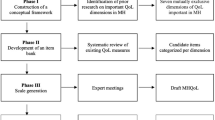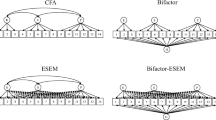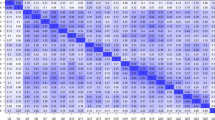Abstract
There is a growing interest in the measurement of quality of life as an important marker of health outcomes. The General Well-Being Index (GWBI) is a quality of life measure that has been specifically designed to assess psychological distress rather than physical incapacitation. Previous studies using the GWBI have mainly focussed on clinical samples (e.g., depressed patients). The aim of the current study was to examine the psychometric properties of the GWBI in a non-clinical population. Using data gathered from 447 first year University students, the GWBI was found to have excellent psychometric properties. Both internal consistency and test–retest reliability were high, and the concurrent and construct validity of the measure were sound. Factor analysis revealed three significant factors, which were labelled ‘general mood/affect’, ‘life satisfaction/vitality’, and ‘poor physical health/somatic complaints’. Limitations to the present study are further discussed.
Similar content being viewed by others
References
G Andrews L Peters M Teeson (1994) The Measurement of Consumer Outcome in Mental Health Clinical Research Unit for Anxiety Disorders Sydney
SM Hunt SP McKenna (1992) ArticleTitleA British adaptation of the General Well-Being Index: A new tool for clinical research Br J Med Econ 2 49–60
H Dupuy (1984) The Psychological General Well-Being Index N Wenger M Mattson C Furberg J Elinson (Eds) Assessment of Quality of Life in Clinical Trials of Cardiovascular Therapies Le Jacq New York 170–183
M Monk (1981) ArticleTitleBlood pressure awareness and psychological well-being in the Health and Nutrition Examination Survey Clin Invest Med 4 183–189 Occurrence Handle7337990
MJ Naughton I Wicklund (1993) ArticleTitleA critical review of dimension-specific measures of health-related quality of life in cross-cultural research Qual Life Res 2 397–432 Occurrence Handle10.1007/BF00422216 Occurrence Handle8161976
SA Montgomery M Asberg (1978) ArticleTitleA new depression scale designed to be sensitive to change Brit J Psychiatry 134 382–389
SP McKenna SM Hunt A Tennant (1993) ArticleTitlePsychological well-being in depressed patients Int J Methods Psychiatr Res 3 245–251
SP Hodgson VA Wood R Langton-Hewer (1996) ArticleTitleIdentification of stroke careres ‘at risk’: A preliminary study of the predictors of carers’ psychological well-being at one year post stroke Clin Rehabil 10 337–346
JL Hopton SM Hunt C Shiels C Smith (1995) ArticleTitleMeasuring psychological well-being. The Adapted General Well-being Index in a primary care setting: A test of validity Fam Pract 12 452–460 Occurrence Handle8826065
PF Lovibond SH Lovibond (1995) ArticleTitleThe structure of negative emotional states: Comparison of the Depression Anxiety Stress Scales (DASS) with the Beck Depression and Anxiety Inventories Behav Res Ther 33 IssueID3 335–343 Occurrence Handle10.1016/0005-7967(94)00075-U Occurrence Handle7726811
PF Lovibond SH Lovibond (1995) Manual for the Depression Anxiety Stress Scales EditionNumber2 Psychology Foundation Sydney
TA Brown BF Chorpita W Korotitsch DH Barlow (1997) ArticleTitlePsychometric properties of the Depression Anxiety Stress Scales (DASS) in clinical samples Behav Res Ther 35 IssueID1 79–89 Occurrence Handle10.1016/S0005-7967(96)00068-X Occurrence Handle9009048
MM Antony PJ Bieling BJ Cox MW Enns RP Swinson (1998) ArticleTitlePsychometric properties of the 42-item and 21-item versions of the Depression Anxiety Stress Scales (DASS) in clinical groups and a community sample Psychol Assess 10 176–181 Occurrence Handle10.1037//1040-3590.10.2.176
Author information
Authors and Affiliations
Corresponding author
Rights and permissions
About this article
Cite this article
Gaston, J.E., Vogl, L. Psychometric properties of the General Well-Being Index. Qual Life Res 14, 71–75 (2005). https://doi.org/10.1007/s11136-004-0793-z
Accepted:
Issue Date:
DOI: https://doi.org/10.1007/s11136-004-0793-z




